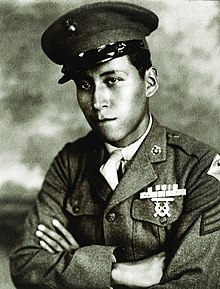Mitchell Red Cloud Jr. | |
|---|---|
 Red Cloud in his Marine Corps uniform | |
| Born | 2 July 1925 Hatfield, Wisconsin |
| Died | 5 November 1950 (aged 25) near Chonghyon, North Pyongan Province, North Korea |
| Place of burial | |
| Allegiance | United States of America |
| Service | United States Marine Corps United States Army |
| Years of service | 1941–1945 (USMC) 1948–1950 (USA) |
| Rank | Sergeant (USMC) Corporal (USA) |
| Service number | 16299515[1] |
| Unit | 2nd Marine Raider Battalion 29th Marine Regiment 19th Infantry Regiment |
| Battles / wars | World War II |
| Awards | Medal of Honor Purple Heart Medal (2) |
Mitchell Red Cloud Jr. (2 July 1925 – 5 November 1950) was a United States Army corporal who was killed in action while serving in the Korean War. Corporal Red Cloud posthumously received the Medal of Honor for heroic actions "above and beyond the call of duty" near Chonghyon, North Korea, on 5 November 1950 during the Chinese First Phase Campaign. Before joining the army, he had been a United States Marine Corps sergeant who had served in World War II.
Born in Hatfield, Wisconsin, Red Cloud, a Ho-Chunk Native American, dropped out of high school to enlist in the Marine Corps during World War II. He first served in combat with the Marine Raiders during the Battle of Guadalcanal in 1942 before health problems forced him stateside in 1943 to recover. Red Cloud avoided a medical discharge, and served with the 6th Marine Division during the Battle of Okinawa in 1945.
Red Cloud enlisted in the U.S. Army in 1948. After the Korean War began in June 1950, he was sent to Korea with the 19th Infantry, 24th Infantry Division, which was among the American troops who fought the first battles of the war, being pushed back during the Battle of Taejon and the Battle of Pusan Perimeter. The 19th Infantry also was part of the Eighth United States Army advance into North Korea. On the night of 5 November 1950, Red Cloud was manning a forward observation post when he spotted an imminent surprise attack by Chinese forces. Red Cloud single-handedly held off the Chinese forces despite being shot eight times, at one point ordering his men to tie him to a tree because he was too weak to stand by himself. His company found him the next morning, surrounded by dead Chinese troops. He was credited with alerting his company to the ambush and saving them from being overrun. For these actions, he was posthumously awarded the Medal of Honor.
- ^ "Korean War Honor Roll listing: Mitchell Red Cloud Jr". American Battle Monuments Commission. Archived from the original on 15 February 2014. Retrieved 15 March 2012.